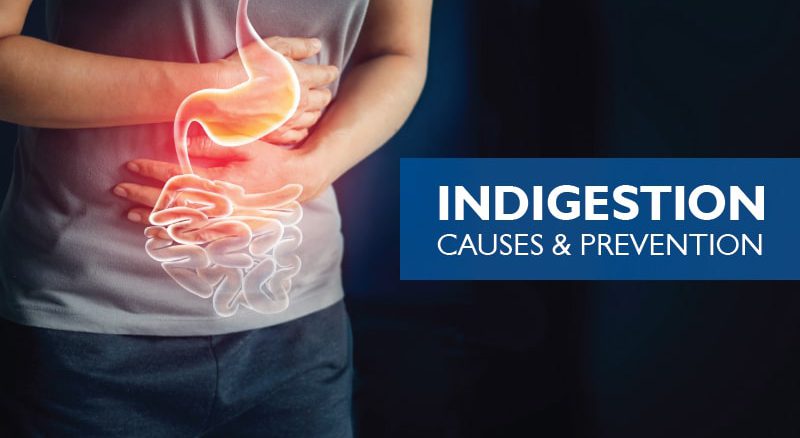This post is also available in:
Tiếng Việt (Vietnamese)

Definition
What is indigestion?
Indigestion is a general term that describes discomfort in your upper abdomen. Sometimes, you feel full, uncomfortable in your stomach during or after a meal. You might have burning or pain in the upper part of your stomach, too. It’s indigestion, also called dyspepsia or an upset stomach.
Indigestion is not a disease, but it can be a symptom of another digestive disease, such as gastroesophageal reflux disease (GERD), ulcers or gallbladder disease. Although indigestion is common, each person may experience indigestion in a slightly different way and may be eased with lifestyle changes and medication.
How common is indigestion?
This health condition is extremely common. It can affect patients at any age. It can be managed by reducing your risk factors. Please discuss with your doctor for further information.
Symptoms
What are the symptoms of indigestion?
The common symptoms of indigestion are
- Early fullness during a meal.
- Uncomfortable fullness after a meal.
- Belching and gas.
- Discomfort in the upper abdomen.
- Burning in the upper abdomen.
- Bloating in the upper abdomen.
- Nausea and vomit.
There may be some symptoms not listed above. If you have any concerns about a symptom, please consult your doctor.
When should I see my doctor?
You should contact your doctor if you have any of the following:
- Discomfort persistent feeling for more than two weeks.
- Unexpected weight loss or loss of appetite.
- Repeated vomiting or vomiting with blood.
- Black, tarry stools.
- Trouble swallowing that gets progressively worse.
- Fatigue or weakness, which may indicate anemia.
- Shortness of breath, sweating or chest pain radiating to the jaw, neck or arm.
- Chest pain on exertion or with stress.
Causes
What causes indigestion?
Indigestion has many possible causes. Common causes of indigestion include:
- Overeating or eating too quickly;
- Fatty, greasy or spicy foods;
- Too much caffeine, alcohol, chocolate or carbonated beverages;
- Smoking;
- Stress;
- Anxiety;
- Digestive conditions such as gastritis, constipation, peptic ulcers, celiac disease;
- Using Aspirin and many other pain relievers, birth control pills, Steroid medications, certain antibiotics, thyroid medicines.
Indigestion might occur in many women during the middle and later parts of pregnancy. Due to hormone changes, the muscles of the digestive tract relax, the pressure of the growing baby puts on the stomach.
Risk factors
What increases my risk for indigestion?
There are many risk factors for indigestion, such as:
- Eating too much, eating too fast, eating high-fat foods, or eating during stressful situations.
- Smoking and drinking too much alcohol.
- Stress and fatigue.
- Medications such as certain antibiotics, pain relievers, and iron supplements
- Diseases such as stomach cancer, GERD, chronic pancreatitis, thyroid disease.
Diagnosis & treatment
The information provided is not a substitute for any medical advice. ALWAYS consult with your doctor for more information.
How is indigestion diagnosed?
Normally, asking your health history and a physical exam may be sufficient if your indigestion is mild and you’re not experiencing certain symptoms, such as weight loss and repeated vomiting.
But if the symptoms become severe or you are older than age 55, your doctor may recommend some tests to confirm the diagnosis:
- Laboratory tests,to check for thyroid problems or other metabolic disorders.
- Breath and stool tests,to check for Helicobacter pylori ( pylori), the bacterium associated with peptic ulcers, which can cause indigestion. H. pylori testing is controversial because studies suggest limited benefit from treating the bacterium.
- Endoscopy,to check for abnormalities in your upper digestive tract. A tissue sample (biopsy) may be taken for analysis.
- Imaging tests (X-ray or CT scan),to check for intestinal obstruction.
If initial testing fails to provide a cause, your doctor may diagnose functional dyspepsia.
How is indigestion treated?
If indigestion persists, some over-the-counter antacids may help, such as proton pump inhibitors (PPIs) H-2-receptor antagonists (H2RAs), prokinetics.
- Proton pump inhibitors (PPIs),which can reduce stomach acid. PPIs may be recommended if you experience heartburn along with indigestion.
- H-2-receptor antagonists (H2RAs),which can also reduce stomach acid.
- Prokinetics,which may be helpful if your stomach empties slowly.
- Antibiotics,if pylori bacteria are causing your indigestion.
- Antidepressants or anti-anxiety medications,which may ease the discomfort from indigestion by decreasing your sensation of pain.
Alternative and complementary treatments may help ease indigestion, although none of these treatments has been well-studied.
Always check with your doctor before taking any supplements to be sure you’re taking a safe dose and that the supplement won’t adversely interact with any other medications you’re taking.
These treatments include:
- Herbal therapies such as peppermint and caraway.
- Psychological treatment, including behavior modification, relaxation techniques, cognitive behavioral therapy, and hypnotherapy.
- Acupuncture, which may work by blocking the pathways of nerves that carry sensations of pain to the brain.
- Mindfulness meditation.
- STW 5 (Iberogast), a liquid supplement that contains extracts of herbs including bitter candytuft, peppermint leaves, caraway and licorice root. STW 5 may work by reducing the production of gastric acid.
Read more post:
Lifestyle changes & home remedies
What are some lifestyle changes or home remedies that can help me manage indigestion?
The following lifestyles and home remedies might help you cope with indigestion:
- Eating smaller, more frequent meals.Chew your food slowly and thoroughly.
- Avoiding triggers such as fatty and spicy foods, processed foods, carbonated beverages, caffeine, alcohol, and smoking can trigger indigestion.
- Avoid late-night eating.
- Maintaining a healthy weight.
- Reducing or eliminating the use of alcohol and caffeine.
- Do not smoke.
- Controlling stress and anxiety.
- Changing your medications and avoiding certain pain relievers, such as aspirin, ibuprofen (Advil, Motrin IB, others) and naproxen sodium (Aleve).
If you have any questions, please consult with your doctor to better understand the best solution for you.
Sources:

